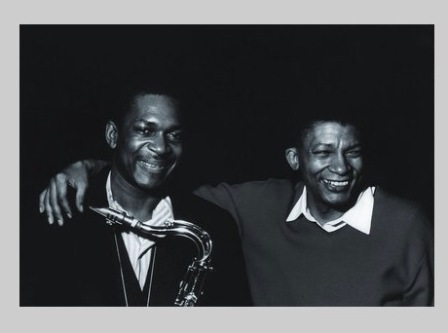John Coltrane and Johnny Hartman
Marking the fiftieth anniversary this year of the release of classic album John Coltrane and Johnny Hartman, an Impulse! recording session that has more than stood the test of time and occupies a very special place in the hearts and minds of jazz musicians and fans the world over, a new concert presentation, My One And Only Love, featuring singer Ken Haddock, saxophonist Meilana Gillard, pianist Scott Flanigan, bassist Nick Scott, and drummer Steve Davis, takes place next month. In a special in-depth focus Ken Haddock discusses the album’s sheer impact, and the concert’s musical director, pianist Scott Flanigan, explains that the accent is firmly on authenticity
How did you first come across the voice of Johnny Hartman, and what attracted you to his sound fundamentally?
Ken Haddock: Coltrane was my first introduction to Hartman around 20 years ago and I’m reluctant to admit, that until recently I wasn’t a huge fan of the album. I liked it OK and knew its greatness and how high it sat on the altar of jazz but I just didn’t really connect with it. I think I can only put that down to the fact that the album nestled in a comfy spot within my Coltrane collection and any time I went to Coltrane it was usually for a riot, consequently the album was under played and neglected. At the age of 50 and 50 years on from the recording I am only now properly discovering and falling in love with the wonderful voice of Johnny Hartman.
Would it be the register, the timbre, or simply his interpretation of the lyrics of these great songs you’re going to sing at the Strand, or something else entirely, that compelled you to step up to the plate?
KH There’s no way I’m stepping on any plates. This stuff is a joy to sing. I’ve been singing along with this album in the car for the past four months and if I can impart a small fraction of the tenderness and romantic persuasion that Hartman delivers on these tracks then we will succeed I’m sure in our endeavour to pay homage to this fantastic work. To quote Meilana Gillard ‘they don’t make music this tender any more’ and it’s true. On the album there are no vocal pyrotechnics, it hasn’t been over sweetened and importantly, there is no ego in there. I guess that’s probably something Coltrane heard way before the record.
Will you be freely interpreting the material, or sticking closely to the arrangements on the album? 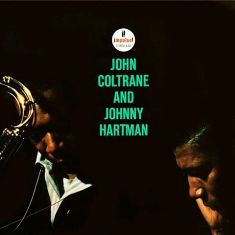
KH When the idea of doing this project was first talked about we all felt it would be a good idea to perform the album from top to toe, as is. We will be sticking dangerously close to the arrangements. Obviously Meilana will have a bit of freedom for improvisation on the Coltrane parts but I will be singing the songs as I know them from the album. I will have the luxury of being able to do that as I really don’t have much to lose. I know that some have paid tribute to the album with barely unrecognisable arrangements of the songs. Fantastic and all as Kurt’s nod to the album was, we want to create an experience for those who know the album well, that will be one of nostalgia and I hope an enjoyable journey back to the songs being performed live, paying homage to the album itself rather than just the songs that are contained on it. Again in this respect, we have carefully chosen the venue for the performance. The Strand cinema and particularly the room we are playing in has a great retro Sixties feel. For the non-jazzers in the audience, we hope to evangelise them and secure a few sales for the Hartman and Coltrane families.
Do you think Hartman corresponds to what many people consider is a classic jazz voice? Notions of what that is seem to vary a lot.
KH I always thought that Ella had a classic jazz voice but I’d never say that Billie didn’t. I understand that Hartman didn’t really consider himself a jazz singer and was somewhat reluctant to get involved in the project. I would consider his delivery of the songs on that album as very much a classic jazz voice.
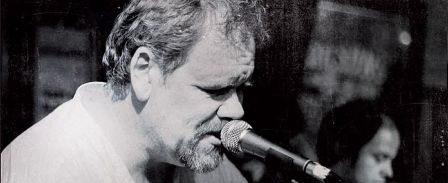
Ken Haddock
Would you say that there is a tenderness in Hartman’s approach that met its match in Coltrane’s? Is that why the album is such a classic?
KH I referred earlier to Coltrane’s riotous output which I love, but when you listen to ‘Naima’ or ‘Soul Eyes’, there can be no mistaking the notion that one day John would work alongside a balladeer. I think I’m right in saying that the Hartman Coltrane album was the only time he worked with a vocalist. Probably he said to himself on listening back for the first time ‘my work is done here’ (even if it was only in one afternoon session). It’s scary isn’t it to think of a level of musicianship that high. It really is mind blowing. Hartman was probably surprised at John’s sensitivity to the session and I’m sure also delighted.
When did you first hear Meilana, and what do you like most about her sound?
KH I first heard Meilana round at Ronnie Greer’s house on a CD that had been recorded at a BBC session, and I remember stopping him right there and getting to him to rewind back as I give out a few who the fuck is thats? She has a big open tone, a big Dexter-y Gordon, Sonny Rollins thing going on. There is an iron purpose about her playing which you would think might restrict her on these ballads, but no. She is playing the tunes wonderfully in rehearsals and the Hartman Coltrane is her favourite album of all time.
I know you’ve been performing in more jazz situations lately. What’s the most striking impression you’ve had of this new setting, and how does it contrast with your other gigs and career in music so far?
KH I would do the jazz gigs for free and will probably have to from what I hear from some of the players around. I love, love, love singing this stuff. It’s much more demanding in a technical sense and I’m quickly beginning to realise that I’m probably going to have to give up the smokes. I am enjoying the freedom in phrasing and expression on tunes and just being around the music on stage is feeling very homely. People don’t know me for singing jazz but they don’t understand that I have been listening to this music for most of my adult life.
Do you think we have lost something in terms of sheer craft and communication since the 1960s in terms of jazz singing? If so why do you think that is?
KH Not sure about that. I think that was obviously a golden era in jazz and it’s where all the great horn, drum, bass, piano players and indeed singers reside for all jazz enthusiasts. I have to say, however, today we have singers like Kurt Elling. He is just wonderful and he communicates the music as well as any singer I have ever heard. He’s certainly the best jazz singer of our time, by a long way.
Do you see jazz vocals as a very American style in essence?
KH Absolutely. I have always believed that America owns jazz. It’s their folk music. Yes, there are some great European contributors and you could fill pages and books with their names, some wonderful wonderful players and composers, but jazz is more than style. It’s part of American culture.
If push were to come to shove, which of the songs on the album sum up the atmosphere of the record best, and why?
KH I think it’s ‘Lush Life’. Ever since we set about going through these tunes we always referred to ‘Lush Life’ as being the biggie. It’s the steak on the plate and the rest are gorgeous veg steamed to perfection with a wonderful autumn serenade sauce. It’s just such a classic song and the treatment on this record is definitive.
What appeals to you most about Hartman’s collaboration with John Coltrane to sum up?
KH Hearing Hartman’s voice makes me want to melt and having him team up with the greatest tenor saxophone player the world has ever heard is just beyond superlatives. How I neglected this album in previous years will haunt me in the future and so it should.
The concert’s musical director, Scott Flanigan, describes the build-up to the gig
Did you have to freshly transcribe the John Coltrane and Johnny Hartman album including the lyrics?
Scott Flanigan: All of the tunes are standard tunes that all jazz musicians would be familiar with but Trane and Hartman had their own individual forms on the tunes; for example, some solos might be in a double time feel, and have specific intros. We’re sticking closely to the form of the tunes but all the solos will be improvised.
Talk me through some of the songs: for instance ‘They Say It’s Wonderful’. Are you familiar with it from other versions, and have you played the song before? If so does the arrangement on John Coltrane and Johnny Hartman fundamentally differ?
SF Some of these songs I hadn’t played before; ‘Dedicated to You’, ‘They Say It’s Wonderful’, and ‘Autumn Serenade’ were new tunes to me to play. However, I’ve known the album for quite some time and that’s where I first heard these tunes. Other tunes – especially ‘My One And Only Love’ – is one I’ve played over the years and it’s a fantastic tune. Certainly one of my favourite recordings of this is from Joshua Redman’s great live album Spirit of the Moment.
How is ‘Lush Life’ the “biggie”, from an arranging and technical point of view?
SF ‘Lush Life’ is, for me, the centrepiece of the album. It’s the one that challenges the band the most, especially the pianist. The long introduction is just piano and voice and on the original, both McCoy Tyner and Johnny Hartman take turns at leading specific sections with the other following. It’s a proper musical conversation between the two of them with the medium being the great music and lyrics of Billy Strayhorn. Once the band come in after the introduction the song weaves its way around a number of keys before ending with a fantastic climbing section which the whole band dig into.

Scott Flanigan
Have you had to transpose any of the key signatures or alter the tempos dramatically on any of the songs?
SF Ken’s voice is similar in timbre to Hartman’s so thankfully we didn’t have to change any of the keys. We’ll be doing the same tunes at the same tempos in the same keys to try and capture the magic of the album. For me, keys are like colours and we’d rather keep each tune in the original ‘colour’ to avoid changing the feel of the piece.
How do you relate to McCoy Tyner in terms of his comping? Is it very much a modal approach; or just classic accompaniment of the period even though he generally didn’t accompany singers then (or now)?
SF McCoy showed what an incredible musician he is on this album. With this album, McCoy knows his place as a pianist backing a singer. He’s a very appropriate accompanist – sometimes leading, sometimes following, and always listening.
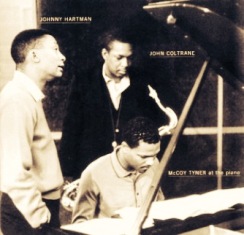
Johnny Hartman (left), John Coltrane, and McCoy Tyner
Are you all going to perform the songs in sequence for the concert as on the album, all the songs on the A side first, and then the B set, or will their order be altered?
SF We’ll be performing the album from start to finish with very little between each song. An album is like a book with chapters and we’ll be mirroring that by having each chapter follow the next. The album has a nice arc to it, starting slowly and ending with the most upbeat tune of the tune (if you can call it that!) ‘Autumn Serenade’.
Kurt Elling’s approach to the album, and Ernie Watts’ was very different wasn't it? The album also had spoken word, one of the Kurtster’s customised touches, for one, adding a narrative aspect. Have you any curveballs in mind to add your own stamp to the performance?
SF I remember hearing Kurt Elling’s approach to the album when it came out [2009 Concord album, Dedicated to You: Kurt Elling Sings the Music of Coltrane and Hartman] and I’ve listened to it on and off over the years. He has taken the album as a basis for a Kurt Elling album, and wanted to do his own thing. Had he done a straight recording of the album with the original arrangements he would constantly be compared to Hartman, and clearly wanted to avoid that. There are some great arrangements on his album but for us, we wanted to pay homage to the album itself and perform it as is. We’ve been lucky in that Meilana is a fantastic tenor player heavily influenced by Coltrane and Ken’s voice has a lot of similarities to Hartman, so the guts of the performance are right there. It’s a natural fit for those two fantastic musicians to be paying tribute to this album. The second half of the show will be a mix of tunes that inspired the album and songs Coltrane and Hartman enjoyed performing separately. They’ll all be arranged in the same style as the originals so our aim with the second half is to imagine what might have been had they recorded another album.
How to you think Ken’s range compares to Hartman’s? When did you first perform with him, and for that matter with Meilana and Nick Scott?
SF Ken’s voice is similar to Hartman’s but not identical. Fifty years on, some of the vocal stylings that Hartman employed sound somewhat dated – for example, the glissando he uses going into the last note of ‘My One and Only Love’. It’s a very old fashioned way of singing, and Ken doesn’t naturally have those stylings in his own approach to songs. For him it’s been a great opportunity to sing quietly and really let the words and the melody shine through. I first performed with him on a gig with the great guitarist Ronnie Greer, and at the end of the gig we were just chatting and I was sitting at a backstage piano. Ken told me he really liked jazz, and I started to play through one of my favourite ballads ‘When I Fall In Love’. He wasn’t so familiar with the words but Ronnie called them out and Ken sang the melody. There and then we decided that it would be a great idea to perform the great album Coltrane and Hartman with Meilana.
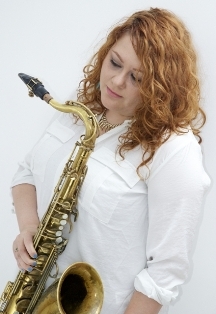
Meilana Gillard
Nick I have played with a number of times over the years, usually with Linley Hamilton. He’s a fantastic bassist and very appropriate for this album. On initial listen I thought it would be a very simple album for a bassist but there’s a lot going on for the bass player, particularly in the bridge of ‘My One and Only Love’, which almost sounds like a bass solo! Nick was right on it from the very first rehearsal. Meilana and I started gigging together when she moved here just over a year ago and she’s revitalised the jazz scene over here. Her big sound and encyclopaedic knowledge of not just jazz harmony but history too make her a very in-demand musician. She’s a natural fit for this music because she’s very influenced by Coltrane and loves this one particular album. On the first rehearsal she was throwing in quotes from the original album and we all picked up on them straightaway, which made the whole rehearsal very enjoyable indeed.
You’ve worked with Steve Davis a lot. How does his sound, in terms of matching it here, compare or contrast with Elvin Jones’, and will he be choosing a kit equivalent to what Elvin used for authenticity?
SF Steve, like Meilana is a font of jazz history. He was very familiar with the album and Elvin’s style. Elvin plays very lightly on this album and occasionally leads tempo changes in some sections, which Steve was right on top of. Some of the solos take on a double time feel and Steve was keeping it very authentic in that respect. He’ll be using an authentic 1960s Ludwig kit, which might take a little while to set up but sounds fantastic and has that authentic 60s jazz sound. All the drums sound very homogeneous on it which isn’t always the case with a newer kit.
What's the piano like you’re going to be playing?
SF I’ll be playing a Yamaha baby grand piano. Right from initial discussions about the album we wanted to have that warmth you get from an actual grand piano and so it was an obvious decision to use a real piano instead of a keyboard. We’re really trying to keep it as authentic as possible in terms of sound and between the real piano and Steve’s vintage Ludwig kit it should have an authentic 1960s jazz sound.
My One and Only Love is at the Strand Arts Centre in Belfast on Sunday 15 December at 7.30. Tickets: http://www.strandartscentre.com
Read an interview with Meilana Gillard here published ahead of the release of DanaMeilana6 debut JazzNBelfast earlier this year: http://www.marlbank.net/interviews/824-make-it-real
